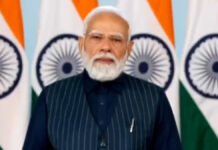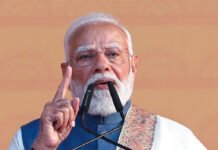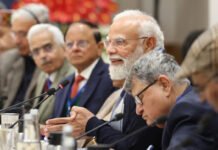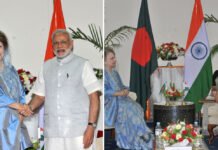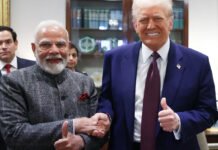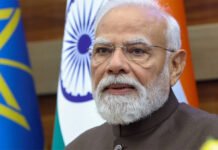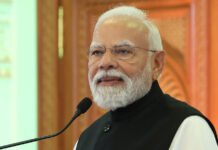INVC NEWS
New Delhi : Explore the transformative insights from Prime Minister Narendra Modi’s address at the G20 Trade and Investment Ministers’ Meeting in Jaipur, Rajasthan. Gain a comprehensive understanding of India’s economic trajectory and its role in shaping global trade and investment.
The esteemed Prime Minister of India, Narendra Modi, addressed the G20 Trade and Investment Ministers’ Meeting held in the culturally vibrant city of Jaipur, Rajasthan. This historic address marked a pivotal juncture in global economic discourse, as the Prime Minister’s visionary insights laid the foundation for shaping the future of international trade, investment, and economic resilience.
A Warm Welcome to Jaipur: Gateway to Trade and Culture
The Prime Minister commenced his address by extending a warm welcome to the attendees, highlighting the cultural significance of the Pink City, Jaipur. Known for its enterprising populace and dynamic spirit, Jaipur symbolizes the essence of trade and cross-cultural exchange that has transcended geographical boundaries throughout history. The Prime Minister’s eloquent articulation set the stage for a comprehensive exploration of the economic landscape.
Trade as a Catalyst for Progress
Shri Modi underlined the profound impact of trade on global progress, emphasizing that trade has not only facilitated the exchange of goods and services but has also been instrumental in fostering the exchange of ideas, cultures, and technological advancements. He astutely pointed out that trade and globalization have played a pivotal role in lifting millions out of extreme poverty, underscoring their indispensable role in shaping a more equitable world.
India’s Remarkable Economic Trajectory
With undeniable confidence, the Prime Minister showcased India’s remarkable economic trajectory, positioning it as a beacon of opportunities and possibilities. Through concerted efforts over the past nine years, India has ascended to the ranks of the world’s fifth-largest economy. The Prime Minister attributed this transformative journey to the principles of “Reform, Perform, and Transform,” elucidating how increased competitiveness, transparency, and innovation have propelled India’s ascent on the global economic stage.
Innovation and Digitization: Pioneering India’s Growth
The Prime Minister shed light on India’s progressive stride in embracing innovation and digitization, which have been pivotal in shaping its economic landscape. Initiatives such as “Make in India” and “Aatma Nirbhar Bharat” have invigorated the manufacturing sector, fortifying India’s self-reliance. The shift from red tape to red carpet and liberalized foreign direct investment (FDI) flows have catalyzed India’s appeal as a global investment destination. Moreover, the establishment of dedicated freight corridors and industrial zones reflects India’s commitment to fostering economic growth and efficiency.
Navigating Global Challenges: A Call for Collaborative Resilience
Addressing the prevailing global challenges, including the pandemic and geopolitical tensions, the Prime Minister exhibited sagacious leadership by emphasizing the collective responsibility of G20 nations in rebuilding confidence in international trade and investment. He advocated for the creation of resilient and inclusive global value chains that can withstand future disruptions. In this context, India’s proposal for a Generic Framework for Mapping Global Value Chains emerged as a beacon of pragmatic foresight.
Technology’s Transformative Power
Acknowledging the transformative power of technology in trade, the Prime Minister lauded India’s shift to the Goods and Services Tax (GST) regime, streamlining inter-state trade through an online single indirect tax. The Unified Logistics Interface Platform and the “Open Network for Digital Commerce” garnered attention as game-changers poised to democratize the digital marketplace ecosystem. The Prime Minister envisioned a future empowered by digitization, where e-commerce and digital processes foster enhanced market access and streamlined trade documents.
India’s Commitment to a Rules-Based Trading System
At the core of India’s trade philosophy lies a commitment to a rules-based, open, inclusive, and multilateral trading system, with the World Trade Organization (WTO) playing a pivotal role. The Prime Minister’s resolute advocacy for the concerns of the Global South at the 12th WTO Ministerial Conference highlighted India’s dedication to safeguarding the interests of farmers and small businesses. The significance of Micro, Small, and Medium Enterprises (MSMEs) in global employment and GDP was underscored, as India’s proactive measures aimed to empower these entities for collective societal growth.
Conclusion: A Future of Inclusive Trade
In a resounding conclusion, the Prime Minister reemphasized the collective responsibility of G20 members in fostering confidence in international trade and investment. He envisioned a future where the global trading system evolves into a more representative and inclusive entity, echoing the spirit of unity that defines the G20 as One Family. As PM Narendra Modi’s words echoed across virtual spaces, a new chapter in global economic resilience and collaboration was marked.


